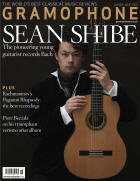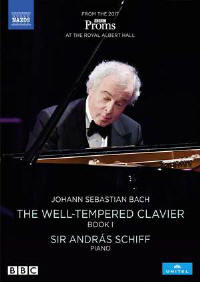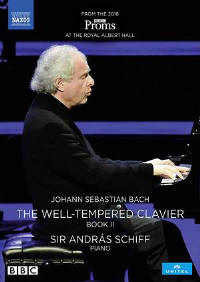Texte paru dans: / Appeared in:
|
|||||||||
|
Outil de traduction (Très approximatif) |
|||||||||
|
Reviewer:
Jed Distler András Schiff’s penchant for cyclical programming started to reach Busonian proportions in the 21st century’s first decade, and hasn’t let up yet. Think about his Schumann and Schubert marathons, or pairing Bach’s Goldberg and Beethoven’s Diabelli variation sets on the same programme, with the Arietta from Beethoven’s Op 111 Sonata as an encore. Or all of Bach’s French Suites in one concert, and the complete Partitas in another. And all by heart, I might add. The 2017 BBC Proms featured Schiff playing Bach’s Well-Tempered Clavier Book 1 in a single bound, with the longer Book 2 in 2018 – perhaps an even greater feat of memory. Both concerts now appear on home video. Not all pianists in their mid-sixties are necessarily at the peak of their powers. Schiff unquestionably is. His technical and musical mastery consistently aims high and digs deep, seeming to bypass the piano and penetrating each Prelude and Fugue on its own terms. When I reviewed Schiff’s 2011 ECM remakes of the ‘48’ (11/12), I noted myriad instances of interpretative refinement and rethinking in comparison with the pianist’s 1980s Decca traversals (9/86, 3/87). The live Proms performances are conceptually similar to ECM, albeit enhanced by Helen Scott’s intelligent video direction. Her judicious use of long dissolves, quick cutaways and close-ups complements the structure and flow of each piece, while revealing aspects of Schiff’s body language, facial expressions and fingerwork that one might not notice from a concert-hall seat. Unlike certain world-famous pianists addicted to gesticulating (and we know who they are!), Schiff’s physical economy means all business. His legs are darkly lit, yet one still sees how he achieves his sophisticated and nuanced legato articulation mainly through fingerwork and hand balance, with virtually no help from the sustain pedal. However, before launching into the Book 1 Prelude and Fugue No 7, Schiff silently presses down a low E flat, and presumably holds it with the sostenuto pedal in order to project overtones in the opening phrase. Schiff looks at his hands as if conducting with the eyes, whether cueing in a sopranoline entrance or anticipating a long pedal point. A shift of the shoulders often signifies a point of felicitous harmonic interest. Schiff tends to smile when he effects an unexpected dynamic contrast or approaches a particularly plangent stretto, such as at the end of the Book 1 C major. Once solemn, ricercare-like fugues such as the Book 1 C sharp minor and Book 2 E major establish their steady gait, Schiff often closes his eyes, leaving his tactile savvy and the music to their own devices. And if you’re a patient and persistent viewer, you’ll be able to ascertain Schiff’s fingerings in particularly trenchant passages. Since the BBC engineers capture the singing warmth and prodigious yet never garish colour of Schiff’s Steinway, balancing it out with just a soupçon of the Royal Albert Hall’s ample resonance, one might be tempted to look away from the screen and simply listen. The problem is how to begin describing the concerts’ distinctive moments, because there are so many. Take the Book 1 C minor Prelude, for example: here it’s not your usual driven toccata but rather an imaginatively characterised poem. The Book 1 C sharp minor and Book 2 F minor Preludes become arias of eloquent simplicity, as does the light and buoyant Book 1 D major Fugue. Schiff’s mastery allows for minimum clutter and maximum transparency in the Book 1 A minor and Book 2 G minor Fugues’ close-lying and difficult-to-voice polyphony. The Book 2 C sharp minor Fugue particularly exemplifies Schiff’s ability to differentiate legato and detached articulation with no effort whatsoever; indeed, his careful contrapuntal layering slightly surpasses the ECM recording for lightness and refinement. And while Schiff’s measured tempo for the chromatically astonishing Book 2 B flat minor Fugue is a tad measured for my taste, the Proms performance proves more fluid and less self-aware in detail than the ECM version. For the record, Schiff observes all repeats, and always imbues them with creative yet stylish variations in touch, dynamics and emphasis; note, for instance, how he summons the bass lines to the fore in the second go-round of the Book 2 D major Prelude’s ‘A’ section. All 48 Prelude and Fugue groupings have their respective chapters, whereas ECM’s audio CDs and digital downloads offer each Prelude and each Fugue on separate tracks. Regarding audio quality in and of itself, I prefer ECM’s robust and full-bodied sound. Still and all, these two discs constitute The WellTempered Clavier’s reference video version, a winning combination of the BBC’s high production values and Schiff on peak form at full capacity in music that he profoundly cares about. |
|||||||||






